MSMEs continues to be the heart of our manufacturing sector. They are likely to change their ways of working substantially in the days to come, with Industry 4.0 innovations, with GST implementation, with better infrastructure and better global connectedness. How will the face of the new MSME sector look like in the India of 2025? A panel session at recently-held CII Manufacturing Summit, at Taj Vivanta, in Mumbai, had variety of practitioners serving and operating in the MSME sector share their views on this topic. The panellists were Rangarajan V, Principal, BCG Group (Moderator); Pulin Shah, MD, Reactive Ploymers; Ashfaque Ahmed, MD, Farida Group and Sunil Raibagi, MD, Gudel India. Corporate Citizen brings you their discussion on what are the policy derivatives, labour productivity and job security
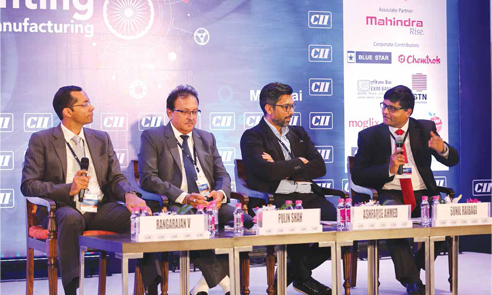 Panellists (L-R) Rangarajan V, Principal, BCG Group (Moderator); Pulin Shah, MD, Reactive Ploymers; Ashfaque Ahmed, MD, Farida Group; and Sunil Raibagi, MD, Gudel India
Panellists (L-R) Rangarajan V, Principal, BCG Group (Moderator); Pulin Shah, MD, Reactive Ploymers; Ashfaque Ahmed, MD, Farida Group; and Sunil Raibagi, MD, Gudel IndiaThe mindset aspect is very important and as we go forward, some of the structural reforms will actually be tapping the potentials that SMEs can really provide. Whenever we think SMEs, we always think jobs, we think about all the ways of working.
Ashfaque Ahmed: I come from industry which deals with leather and footwear. This has been traditionally a very labour-intensive industry. Not much modernised and it employees a lot of people. Like textile, leather and footwear is highly labour-intensive industry. This industry has been changing, is competitive and traditionally, the buyers in this industry have moved from labour-cheap countries—moving around the world from China, to next cheapest place like India, Vietnam, or even Bangladesh. But, they are running out of places to go to. We have benefited a lot from China getting more expensive. Recently we visited Vietnam and Bangladesh, to just see where the competition is. But it is a matter of time when they are going to get expensive. So, the future is not finding places where it is easier and cheaper to manufacture, it is towards Industry 4.0, which is the future.
The current status of my industry and when I look at Industry 4.0, we are far away from it. Our companies or the industry people, would not understand Industry 4.0. There is a huge gap. Now, to bridge this gap—people cannot just stay where they are, neither can they just jump to Industry 4.0. In our leather and footwear industry, they are just in Industry 2.0 and they are not even in Industry 3.0. Basically, 3.0 is more automation— we are mechanised and we are into mass production, but we are not fully automated. And to jump from automated to fully IT-related Industry 4.0, is a big jump. The way I see it for the future—how do we see the leather and footwear industry in 2025? May be we are not in Industry 4.0, in 2025, but we would have taken elements of Industry 4.0, we would have graduated more to 3.0 and fast-track our development in it.
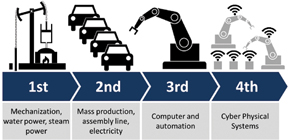 Credit: Christoph Roser at AllAboutLean
Credit: Christoph Roser at AllAboutLeanIn our Farida Group, we employ about 20,000 people and we are graduates of CII Manufacturing Excellence course that we went through for four years and we are currently in a programme with CII, on zero-defect manufacturing. This programme has been one of the best things that has happened to our group. And our group currently, we are the leaders in export for India, in leather products. It has made us survive and compete with China and rest of the world. We manufacture for one of the biggest buyers in the world. Clarks, shoe manufacturer and retailer, for example, they buy 50 million pairs in the world and we are one of the top suppliers, even higher than the Chinese suppliers. And the only way we have competed with them, is through manufacturing excellence, which CII has taught us through cluster programmes.
The future we see for us is, one, a lot of effort is going into training the people we have and unless we reskill the people who are involved in work, upgrade them, it is going to be difficult to bridge this gap. We are taking care of the people, not just by training, but also with the total employee involvement projects. I am so sure that the socio- economic welfare of the people that work in our industry, actually have a better rating than the national rating. We employ lot of people and people who work in this industry, have a higher socioeconomic rating than the average of Tamil Nadu and India’s national average. For example over 120-150 people were involved in making that one pair of shoes that you are wearing right now. In the future, we'd see only 12-15 people involved in making the same pair of shoes. Adidas is doing that already. People who are working in our industry right now, might not want to continue working—there are better industries and more modern industries. But we are making sure that the next generation that is coming out is better equipped to handle the more automated companies and able to cater to industry 4.0. So, people and training are the key part.
"The future is not finding places where it is easier and cheaper to manufacture, it is towards Industry 4.0. We are making sure that the next generation are better equipped to cater to industry 4.0"
— Ashfaque Ahmed
Sunil Raibagi: For example, if you take a car, over 60-70 per cent of its parts come from SME sector. SMEs have realised a lot of interesting points—there is a big change in technology and change in technology brings a lot of different jobs. There will not be reduction of jobs, there will be change of jobs. With the changing pattern, the jobs have to be different, skills have to be different. What happens is that when there is a change in technology, it leads to change in the manufacturing processes. There will definitely be good growth for the SMEs.
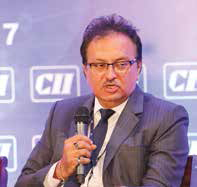
Pulin Shah: We will need to look at the skills first, reskilling the jobs and automate in a way that you are not hurting the environment, but making the same person doing a different job. For reskilling or skill development—I am connected to furniture industry, I am talking about that industry—government has allocated Rs.16,000 crore for next 10 years, to develop the skills in furniture and fittings. Lot of work has been going on and CII has always been on the forefront of teaching people and getting them organised to work on a very efficient way without wastage. We are also part of a cluster run by CII and Godrej. We are also in Industry 3.0 and the first thing that CII taught us was that whatever you can measure, can be controlled. There are so many process controls which has come up—there are things which we really never knew are happening in our company. We have understood what kind of scrap that we are generating, what we can do to generate less scrap and how can we reuse the material. Just the way zero defect, zero effect to the environment is very important. And in my opinion, 2025 may be little to early but definitely there is scope. When you start thinking in terms of reskilling the jobs and giving the jobs of a different kind, we will definitely see a change. For example, there is QR code which is now stitched on the product which we manufacture. This QR code will actually help the customer directly to identify the product and come directly to us and say that this is what exactly he wants again or have a complaint lodged—eliminating the lines between the end customer and the process. I think we are moving in the same direction.
"We will need to look at the skills first, reskilling the jobs and automate in a way that you are not hurting the environment, but making the same person doing a different job"
— Pulin Shah
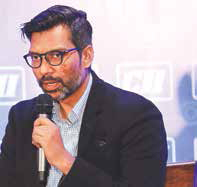
Ashfaque Ahmed: These cluster programmes help upgrade our companies from the fundamentals. In terms of actually the government helping us train and skill our employees— frankly the government is doing a lot of programmes in upgradation of skills and lot of programmes are out there. The quality of these training programmes and upgradation may improve even more, but lot of responsibility is up to the companies. I think the companies can themselves take the onus to upgrade and utilise these resources better and take it one step forward. And I would love to see CII’s cluster programmes spread more. Maybe make that more affordable to a lot of people. I would definitely say skill development is already there, let’s upgrade it, modernise it—maybe the skills are not technical skills, but skills to operate computers and machines better. Cluster programmes are a great help in improving our management system, our basics in the companies.
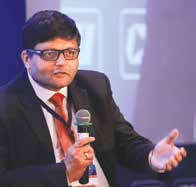
Sunil Raibagi: If you see the today, the machine levels are completely automated. If you take the SME sector, there are going to be changes and those will happen very fast. I would say that there is lot of intelligence building and it will keep coming. Second change will be in workforce; there will be liquid workforce. Half of the people will not want to commute, so they will work from home and half of the people are in the factory, out of which some are humans and some robots. Harmonisation of people with robots, working with robots is going to be a challenge. Another thing is digital transaction, where our country has done well. When demonetisation happened recently, transactions had gone mobile—it was great and we learnt it very well. Even vegetable vendor knew how to accept and pay money with digital transaction—these are big changes of digital reality. Next is virtual reality—we cannot miss the bus, we have to catch the bus; if we are to grow.
Pulin Shah: There exists a very large gap, from the top management to the worker. Middle management in all the SMEs, you will hardly find a proper middle management. I think probably the reason is our education system is not geared up to actually take the industry requirement. In Germany, when they select the person, they have two years of in-plant training, for a diploma holder in the industry. And then without any commitment from the industry, he is either taken in or he is asked to go and apply somewhere else. If we have something like that inculcated within our education system, may be we will have a diploma holder, who then actually gets to learn the industry in the next two years and most probably gets absorbed in the same company. When you have that kind of the thing then you have potential middle management coming up. Or an example of a blue-collar person getting into a white-collar job. Because he is in the factory for two years, he has a handson experience, then because of his degree or his education, he can actually go into the middle management. In Germany, the SMEs have over five generations within one place. No SME in Germany, I visited, was less than 100 years old and the oldest one I visited was 240 years old. When I visited this 240 years company, there was a gentleman who took us around. And his fifth generation was also working in the same company. That’s the kind of employer-employee relations they have. I think we must try to develop such relationships with our employees, so that they remain with us and their skill remains with us. When we start training such people, we assure them that once you get trained within our organisation, you will be absorbed and you will be definitely given a responsible job. This is what is required for the industry. Get the middle management for all the SMEs, otherwise it will not percolate down. We should request the government to have in-plant training for two years, so one gets embedded within the industry.
"The change that is happening is fast and adaptation to this change is not that critical but the philosophy of working fast has to be adapted from top to bottom. There has to be a continuous training and learning"
— Sunil Raibagi

Ashfaque Ahmed: This gap is a big gap we all face it currently. Also the companies investing in technology and ready to put people there, they forget the people who are already with them. They are good people and we are not changing them fast enough. It is also the company’s and industry’s responsibility, to realise that and get to change our people who are already part of business and make them better equipped for the future. Yes, the education system and the training, and the people who are coming out fresh from these institutes, will help us in the future. But, we are running a business right now which is not changing fast enough and the people who are currently working with us have a lot of strain. Because the world is changing so fast, the people who are running the businesses don’t know how to handle the change. So, it’s how we train the people who are already part of the business, to equip themselves to software technology, automation or anything else that is required to move faster. And I think the government and CII have good programmes, it’s a matter of communicating that and just linking that to who are wanting it to use that resource better.
"The world is changing fast, the people who are running the businesses, don’t know how to handle the change. It’s how we train the people who are already part of the business, and equip themselves to move faster "
— Ashfaque Ahmed
Sunil Raibagi: We find that the newcomers are much more knowledgeable, but the middle management is two years behind. The change that is happening is fast and adaptation to this change is not that critical but the philosophy of working fast has to be adapted from top to bottom. There has to be a continuous training and learning. The worker has different problems every day unless we are not making his job easier, he may jump job. He must be able to learn and resolve his problems.
By Rajesh Rao